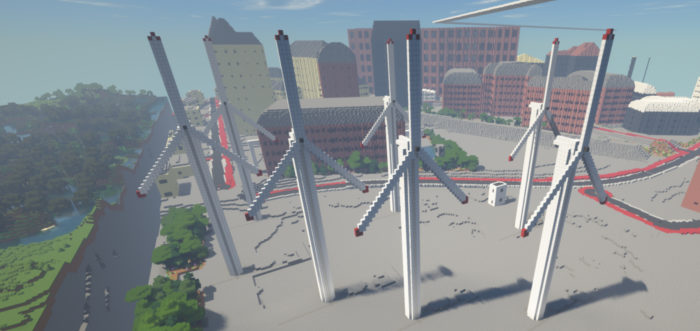Transforming infrastructure to reach net zero
Delivering basic needs
Infrastructure systems, including energy, transport, water, waste and digital, play a crucial role in delivering societal wellbeing. This is particularly important in cities – where infrastructure is most dense and interdependencies between infrastructure, the environment, economy and society are most profound. However, in many cases the infrastructure in cities does not adequately meet the basic needs of citizens, and it often poses serious environmental costs.
Both the Committee on Climate Change and the National Infrastructure Commission have identified that transforming infrastructure systems is essential to the UK’s sustainable development and net zero commitments, and is urgently in need of long-term decision support. Additionally, any efforts towards achieving net zero must be resilient to the impacts of a changing climate, as well as to other crises like COVID-19.
At present, the potential for cities to deliver this transformation is often prevented because of the extreme uncertainty about the effects that would be caused by intervening in a complex system. Decisions taken at national, local and household scales and by organisations in different infrastructure systems can also constrain the ability of cities to act. This makes it very difficult for cities to transform their infrastructure in order to deliver on their social, environmental and economic objectives.
We need to find new adaptive approaches that can allow cities to transform their infrastructure systems, to tackle social deprivation and the climate crisis, whilst accommodating the deep uncertainty associated with the infrastructure system.
Designing a new approach for change
In Leeds, researchers led by Dr Katy Roelich are developing a new approach to decision making that brings together a range of actors, whilst focusing on wellbeing outcomes and long-term planning. The Multi Actor Adaptive Decision Making (MAADM) project is using regional transport planning in Greater Manchester as a case study to develop these approaches. The project uses participatory techniques to ensure the approach and models they design can cope with real world scenarios and meet the needs of decision makers.
The way we move within and between cities needs to change dramatically if the UK wants to meet its net zero ambitions. A new systemic approach is necessary to address the linkages between transport, the economy and wellbeing, whilst accounting for increases in complexity, uncertainty and the number of organisations involved in transformation. Leeds researchers are working with Transport for Greater Manchester to embed multi-actor adaptive decision making throughout their strategic and delivery processes.
Dr Roelich said: “Many UK cities are failing to meet the wellbeing needs of all of their citizens and their ambitious climate commitments. Transforming infrastructure is vital to solving both of these issues.
“We need to find new adaptive approaches that can allow cities to transform their infrastructure systems, to tackle social deprivation and the climate crisis, whilst accommodating the deep uncertainty associated with the infrastructure system.”
 A city designed on Minecraft by members of the public during deliberative workshops in Leeds
A city designed on Minecraft by members of the public during deliberative workshops in Leeds
The MAADM project has set up a Local Infrastructure Commission including representatives from public, private and academic organisations, spanning energy, transport and water sectors. The Commission is exploring how infrastructure needs can be understood; how planning and delivery happens at a local scale; and debating new approaches to decision making to deliver infrastructure that meets local needs. The work is focused on communities, cities and city regions in the north of England, because of the call for greater investment and foresight in this region.
The MAADM project also has a key focus on public engagement in decision making and recently reported the results of deliberative workshops to explore public perceptions of infrastructure in Leeds. The workshops found that explicitly talking about the link between infrastructure and wellbeing, and seeking to engage with the values underpinning perceptions offers more opportunity to find areas of agreement between the public and decision makers.
What next?
- The MAADM project is exploring how adaptive decision making approaches could help develop flexible and robust COVID-recovery strategies for infrastructure, initially in transport. Dr Roelich welcomes enquiries relating to other sectors that face urgent situations and are in need of decision making support.
- The results of work exploring public perceptions of infrastructure is informing a series of citizens’ assemblies on climate change and environmental justice. These include assemblies in Blackpool and Teeside taking place over the next three months, to inform the work of the Environmental Justice Commission. Dr Roelich is open to discussing how these methods could inform other public engagement exercises.
Top image: Manchester Victoria Station Metrolink Platforms, credit: David Dixon
